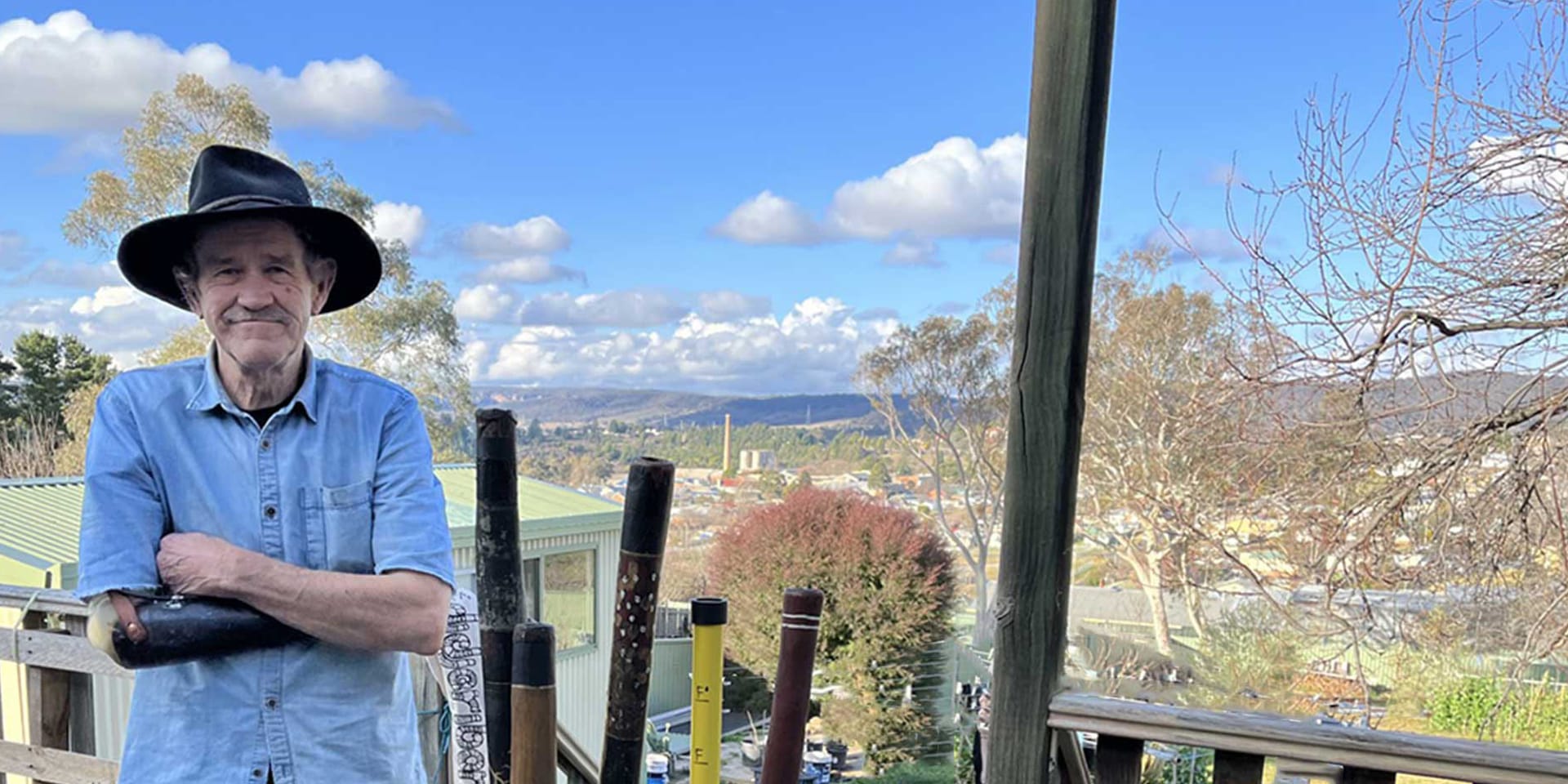What you'll learn
Join renowned didgeridoo player, Charlie McMahon, for an immersive and educational workshop playing didgeridoo.
Held at Portland near Lithgow in NSW Australia, this workshop offers a unique opportunity to delve into the history and traditional use of this iconic instrument. Throughout the day, participants will be introduced to the captivating sounds and techniques of the didgeridoo, guided by Charlie's expertise and passion. From learning about its cultural significance and traditional playing styles to fundamental and basic rhythm techniques, this workshop promises to be an engaging and transformative experience. And what better way to take a break and enjoy the camaraderie than with a traditional fire pit roast vegetable lunch, adding a touch of warmth and connection to this unforgettable workshop. The day concludes with a fire pit roast vegetable lunch, providing a delightful opportunity to relax, socialise, and reflect on the immersive experience shared with fellow enthusiasts.
Learning outcomes
By the end of this workshop, you should have:
- Gained a comprehensive understanding of the history and traditional use of the didgeridoo in Indigenous Australian culture;
- Developed fundamental didgeridoo playing techniques, including breathing control, circular breathing, and creating different sounds and rhythms;
- Explored advanced techniques, such as overtones and vocalisations, to enhance the range and complexity of the didgeridoo playing;
- Acquired basic improvisational skills and creative expression abilities, allowing participants to experiment and collaborate with others in musical contexts.
Course content
Introduction
Welcome and introduction of Charlie McMahon. Brief overview of the didgeridoo and its cultural significance Introduction to the workshop objectives and structure.
Didjeridu Basics
Following introductions didjeridus for the practice are checked out to assess playability and pitch. While participants are encouraged to bring an instrument there are didjs available on loan for those who do not have one and for those whose instruments are determined to be on insufficient quality to play well. Some didjs are made as souvenirs so quality is not guaranteed.
Learning the drone and basic rhythms is the first step to didj playing. We practice how to form the mouth reed or embrasure with lips to sound the drone tone and push air to the mouth with abdominal pressure. Once a drone tone is made, we practice ways of putting rhythm to the drone. This session also involves demonstration of traditional and contemporary didj rhythms. During this and the afternoon prac traditional Arnhem Land didj lore is discussed. Ahead of the workshop once enrolled participants will receive printed articles on traditional and contemporary didj practice and links to useful info online sources.
Fire Pit Lunch
A wholesome lunch of root vegetables is cooked in ashes. Using methods learned from Pintubi folk of the Great Sandy Desert, this will show you how to cook perfectly without foil or other insulation of the food. While cooking we discuss culture and anything else that people are interested pertaining to didj, music and culture. Some books on art and culture are available to see at this time as well
Rhythm Breathing and advanced techniques
To play continuous rhythm requires the knack of constant air flow through the lips while inhaling intermittently through the nose. Also called by a misnomer 'circular breathing' this breath technique, besides being the penultimate goal of didj players is exhilarating or relaxing depending on the breath rate. Indeed, it has been likened to the Prana Yama of Yoga and asthmatics have benefited from playing didj. The physiology of respiration is explained for how it relates to rhythm breathing on didj. Some of the rhythms taught are demonstrated here.
Intended audience
Who is this Didgeridoo Course for?
This course is designed for individuals who have an interest in learning about the didgeridoo and its significance in Indigenous Australian culture, as well as those who wish to develop their skills in playing this unique musical instrument.
Course venue
Imperial Hotel, Portland
Course testimonials
-
Kevin said: Charlie has a wealth of knowledge, it was a privilege to get instruction from him and it was amazing to experience a part of Charlie’s life and community.
-
Daniel said: Had a fantastic time with Charlie! Great class, very laid back, learnt a lot and Charlie was very generous with his knowledge.
Course tutors
Charlie McMahon
Great reasons to enrol in a short course with us
Small classes
A personal approach means quality learning, so you can enjoy plenty of interaction with your instructor and the chance to ask questions.
Short & sweet
Our short courses & workshops get straight to the point, providing the skills you need with minimal commitment of your precious time.
Facilities & equipment
Our range of venues suit every type of course, are easy to get to, and have the equipment and tech needed to support your learning.
Easy, secure enrolment
Enrol online 24/7 with a safe, convenient 3-step process, and you can change your mind up to 7 days before class starts.
Quality instructors
Our educators bring first-hand experience and knowledge, with up-to-the-minute practices from diverse industries.
Business or pleasure
Our courses help you rapidly increase your skills and knowledge, for professional development or personal interest.
4.7 starsaverage rating on Google
1,400+courses to choose from
99%customer support rating
Classes Online Courses
<p>Join renowned didgeridoo player, Charlie McMahon, for an immersive and educational workshop playing didgeridoo. </p>
<p><a href="https://www.google.com/maps/place/Portland+NSW+2847/@-
...<p>Join renowned didgeridoo player, Charlie McMahon, for an immersive and educational workshop playing didgeridoo. </p>
<p><a href="https://www.google.com/maps/place/Portland+NSW+2847/@-
...If there isn't a class to suit you, please join our waitlist and we will notify you when we have places available. Join waitlist for Learn to Play Didgeridoo with Charlie McMahon
If there isn't a class to suit you, please join our waitlist and we will notify you when we have places available. Join waitlist for Learn to Play Didgeridoo with Charlie McMahon


